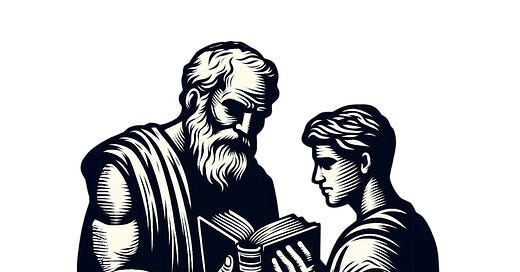For Part I, click here.
If you prefer the audio of this article, click here.
This week we resume our list of books to put some hair on your chest. Last week we gave away the full first half of the list. This week the latter part—which contains both some surprises alongside some absolute cornerstones—will be behind the paywall. We appreciate each and every one of you who subscribes to the Imperium Substack, you help us keep the lights on, and we encourage everyone to spend the few bucks a month to get a detailed article every week.
At the end of this article we will give you a recommended reading order. With that, on to the second half of the list.
Machiavelli – The Prince
Machiavelli is so important that he now has his own adjective, used by people who have no idea about philosophy or political science. The Prince is ground zero for political realism, the idea that political theory should be descriptive before it is prescriptive, but Machiavelli is not nearly as “Machiavellian” as he’s often made out to be. Very often he is at pains to point out where the ruler’s less heavy-handed response not only failed to prevent bloodshed but actually made it worse than it would otherwise have been. Machiavelli’s most famous work is often lumped into a category with Art of War or the Book of Five Rings as a really great way to get ahead in business or some other field, but ultimately its power lies in fatally wounding what we might call “logos”, and saying that the effective leader and the morally upright leader are often two very different things.
Cormac McCarthy – Blood Meridian
Maybe the most violent book since the Iliad. In here we have an America that could not be farther from its supposed Enlightenment roots, which really pushes us back to something feudal and even earlier, back to the steppe. No woman speaks for the first 90% of the book. Men are moved to mindless ultraviolence by nothing at all. This is a hyper-darwinian world where blood flows like monsoon-gorged rivers, and human life is worth only what it can take by force. And yet there is a kind of nobility here. It is the nobility of the plainspoken man whom you may not trust, but who does not pretend to be your friend. The American backcountry of the 19th century was largely populated by settlers from the Scottish borderlands, tough, crude, barbaric men who formed perhaps the last preserve of Bronze Age warrior culture, and who maintained the traditional clan structure longest in the Western world. This is the greatest epic prose poem since Moby-Dick, and it paints a picture of men such as no longer exist. Much to—if not our hurt—then certainly to our enemies’ hurt. They don’t exist, but they ought to.
The Epic of Gilgamesh
One of the oldest known works of literature, but still relatively young in the Western Canon, the epic of Gilgamesh has a tremendous amount to offer a young man. It follows Gilgamesh, the powerful king of Mesopotamian Uruk, whose arrogance leads the gods to create Enkidu, a wild man who becomes his rival and ultimately his friend. Upon Enkidu’s death, Gilgamesh leads a failed quest after immortality, finally accepting the inevitability of death and that a man can live forever only in his deeds. Whereas many myths and religious narratives tell us comfortable just-so stories about eternal bliss, Gilgamesh does not flinch at the reality of the world. In this it comes off as rather more mature and stoic than other stories which tell us what we want to hear, but at the expense of the truth.
The Book of Job
Speaking of unflinching tales, the book of Job is easily the most profound book in Judaism and tells us hard truths rather than noble lies. The story is familiar enough, but the implications are radical and still undigested even thousands of years later—or rather, no longer understood whereas at one point they were. Poor Job whose god torments and destroys him through no fault of his own, finally cries out and demands of Yahweh some account, and in one of the sublimest passages in all world literature, is given a rhetorical beatdown with the question “where were you when I laid the foundations of the world?” The implication is that the highest authority is not questionable even in principle, and that to question it is to set oneself on the throne. This is a hard lesson for us today, having been steeped in 3,000 years of anti-authoritarianism, but the book of Job gives us a glimpse of a time before all that.
Knut Hamsun – Growth of the Soil
This entry in the list was originally occupied by Thoreau’s Walden, which is a fine book. And it may seem odd to substitute a real account of self-sufficient living for a work of fiction. But whereas Thoreau’s work was an experiment carried out in highly artificial conditions over two years, Growth of the Soil is the real deal, the story of a pioneer who arrives in the Norwegian wilderness with nothing and departs from this world with a whole legacy. We watch Isak as his family develops through a whole lifetime, as his children grow and either strike out into civilization or take up his shovel on the farmstead. Hamsun is not romantic about it either—he knows full well that the city is slowly devouring the countryside. An important part of the narrative concerns Isak’s wife who is seduced by the charms of civilization, only to be set to rights again by Isak, though not without hints that the city will continue to swallow up everything. But Growth of the Soil is perfect for inculcating honest work, simplicity, and man’s bond with nature.





